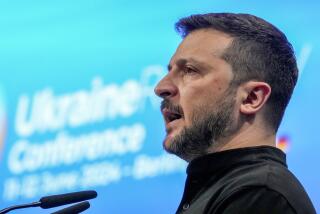Energy-Strapped Ukraine Keeps Chernobyl Open : Environment: The nuclear plant that spewed radiation across Europe in 1986 was to shut down this year. Lawmakers also OK more reactors.
- Share via
KIEV, Ukraine — Ukraine’s Parliament, more worried about energy shortages than environmental safety, voted Thursday to keep the infamous Chernobyl nuclear power plant working and to resume the country’s stalled atomic energy program.
The Soviet-built Chernobyl plant, which spewed radiation across Europe after a 1986 explosion and fire, was to have shut down by the end of this year. That decision, made by the same Parliament two years ago after Ukraine quit the Soviet Union, was based on voluminous evidence that Chernobyl’s RBMK-type graphite reactors were unsafe.
Energy Minister Vilen Semeniuk pushed for the reversal, telling lawmakers that Ukraine is crippled by fuel shortages and by the rising cost of imported oil from Russia. He said the Chernobyl station, 80 miles north of here, should keep working “because it can supply the entire Kiev region with energy for the winter.”
Ecologists in Ukraine and abroad condemned the proposal, and Ukraine’s government divided on the issue. Environment Minister Yuri Kostenko argued that Chernobyl’s shutdown should not be delayed beyond next spring.
But Parliament voted 221 to 38 to keep the station working “so long as technically feasible,” a mandate that could give it an additional lifetime of at least 14 years.
The Chernobyl accident on April 26, 1986, the worst in the history of nuclear energy, forced the evacuation of 180,000 people from surrounding cities and villages. The official death toll was 32, but medical experts say hundreds, perhaps thousands, may have died later from exposure to radiation.
Reactor No. 4, which exploded in 1986, has been encased in steel and concrete ever since. Two of the other three reactors are working. The remaining one, Reactor No. 2, has been off since a fire in 1991, but Thursday’s resolution, adopted after a short debate, will bring it back on line.
Officials at Chernobyl said shutting the plant would have been costly, not only on account of the lost output but also because of the need for electricity from other sources just to maintain the idle reactors.
But Hanna Tsvitkova, a spokeswoman for the environmental group Greenpeace, said that continuing to operate the reactors was dangerous and could prove far more costly.
“Chernobyl is Ukraine’s ecological tragedy,” she said. “The 2% of nuclear energy that Chernobyl supplies to Ukraine’s citizens will never justify Chernobyl’s victims of the past, present and future.”
Germany’s environment minister, Klaus Toepfer, whose country is a leading aid donor to Ukraine, also condemned the vote, calling it “a political decision . . . that disregards international safety concerns.”
The same Parliament resolution ended a five-year moratorium on nuclear energy development imposed in 1990. Lawmakers ordered that three of Ukraine’s five nuclear power plants--Khmelnitsky, Rovno and Zaporozhye--put additional reactors into operation as soon as possible. All use VVER-1000 reactors, whose designs are considered safer than Chernobyl’s.
Mikhailo Umanets, head of Ukraine’s atomic energy commission, said the next reactor could come on line within six months at Zaporozhye, the largest power station.
Ukraine relies on neighboring Russia for more than 80% of its oil and natural gas, which were heavily subsidized in Soviet times. Russia has been raising fuel prices toward world levels, throwing Ukraine’s economy into steep decline.
These harsh realities--plus the fact that nuclear power generates a third of Ukraine’s electrical energy and could produce more--apparently persuaded many lawmakers to reverse anti-nuclear positions.
Even so, some who support nuclear energy criticized the government for pushing them to a vote without sufficient proof that Chernobyl and the other plants are safe.
“This was a political decision without any technical foundation,” said opposition lawmaker Ihor Dercacz, who abstained from voting. “We were not ready for it.”
Some advocates of nuclear energy question continued reliance on Soviet-designed reactors, saying they doom Ukraine to dependence on Russian industries that build and service them.
Dercacz, for one, said Ukraine should seek cooperation with other countries, such as Canada, which manufactures a reactor that Ukraine could fuel with its own natural uranium.
For now, Ukraine depends on Russia for nuclear fuel rods manufactured from uranium ore. Because it does not have money to buy them, Ukraine has spent the last year trying to acquire Russian fuel rods in exchange for the 1,600 former Soviet nuclear warheads on Ukrainian territory. But that deal has been held up by Russia’s insistence on extending delivery of the fuel rods over 20 years.
More to Read
Sign up for Essential California
The most important California stories and recommendations in your inbox every morning.
You may occasionally receive promotional content from the Los Angeles Times.













